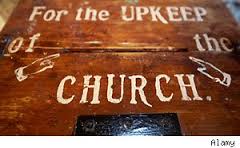In the first century in Palestine Christianity was a community of believers. Then Christianity moved to Greece and became a philosophy. Then it moved to Rome and became an institution. Then it moved to Europe and became a culture. And then it moved to America and became a business. – Priscilla Shirer
Since 2014 promises to be a year of further activity (read: probable change) in terms of church practice for my family, I wanted to begin the year by weblogging some related thoughts. What is church?
Perpetually, inwardly, I deal with questions about what church is, is not, should be, and should not be. I rarely reach conclusions that have any perceptible results, but that doesn’t mean I am devoid of passion about the topic. Nor does it mean there won’t be visible results in the near- or mid-term future. This gnawing feeling inside¹ won’t allow me to stop ruminating, dreaming, working, studying (and sometimes wallowing in depression over the large measure of truth contained in the above quotation).
 I do not want to be part of a church that is nothing more than a small-cap Christian business. I have little more than historical interest in acculturated or institutional Christianity. While I am sometimes stimulated by Christian philosophizing, such thought is not the end-all of church or of the Kingdom of God. Being a part of an authentic, believing community, though? Yes, that much is for me.
I do not want to be part of a church that is nothing more than a small-cap Christian business. I have little more than historical interest in acculturated or institutional Christianity. While I am sometimes stimulated by Christian philosophizing, such thought is not the end-all of church or of the Kingdom of God. Being a part of an authentic, believing community, though? Yes, that much is for me.
We do have a formal “church home” — a nice one, a local one. Within it we find kindness, love, and seemingly genuine faith. Although not enough time has transpired for us to develop much relationship or thoroughgoing trust, we have felt cared for, and our son has had some very positive children’s Bible class experiences. We even experience some camaraderie in non-essentials. This church is pretty good, in terms of its folks. Not so much in terms of its assemblies or facilities, but the people are good, and they appear genuinely to love God.²
Time was when “church search,” for me, was partially synonymous with “search for place to ‘exercise my gifts'” — in other words, a church that had, or would make, a place for me to lead publicly in worship, teach Bible, etc. I think my dad did me a disservice in this respect: my expectations have long since been unrealistic. You see, my dad, as a leader of leaders, would make a beeline for good new people that moved to into the church I grew up in, seeking to get them involved in song leading, making devotional talks, etc. But I have come to find that pretty much no other church does that. You have to be around for years before anyone really sees you as anything more than a fill-in teacher or server-at-communion-table.
Selah
As the congregations of my personal history — eight states and a dozen churches — pass into memory, I realize that the likelihood of being used in church in areas of my giftedness is decreasing. Corporate worship is almost always a source of discouragement, for one reason or another. Mostly, I look for other things now. Sermons and Bible classes and most programs come and go, and a few have impact, but rarely is there a lasting result. More than any hope of finding a good set of programs or a good public teacher or energetic singing or heavenly hospitality or awe-filled worship, my concept of what church should be illuminates my search.

For the past 4+ academic years, our home was a site for weekly “church.” Of course, the church’s identity is not defined by gatherings, nor do I set up our own gatherings as particularly exemplary. We excelled in our commitment to exegetical, excavationary Bible study and regularity of “attendance,” but there was a lot of room for improvement in the activities and flow when we were together. Essentially, a group of growing-closer friends gathered in our living room and dining room every Sunday night for talk, a lot of serious study of the scriptures, some prayer and worship, food and drink, and communion. The picture here is not us, by the way, but its scene looks much like ours.
I miss those gatherings, not having had them since we moved in the summer. So far, we haven’t found any such group to invite ourselves to, and I think it’s time to do something about it. We are going to try to find a few interested souls to invite to our place again. We may now employ real-time video technology — not the same as being there, but nonetheless an opportunity to reach to and from distant dear ones. We’re also looking into other possibilities.
Selah
Last night I sat at length in a discussion with my father, and it was good time spent. While he and I experience here-and-now church somewhat differently, we share many values. He sees the positive, although he is certainly aware of many shortcomings. I identify more negatives and wonder why.
I have become what my wife labels a “pessimistic idealist.” There is more than an ounce of irony in this pairing of words . . . and a pound of yearning. . . .
As I survey churches out there — and I suppose I’ve been in 60 or 70 different church buildings in the past 10 years — I am incessantly impressed with the inadequacy (at best) and lunacy (at worst) of what is going on in the name of church. Meaningless weekly rituals, multiple high salaries, huge edifices, jargon and marketing, copy-catting and kowtowing. It’s enough to drive one mad. OK, maybe that was a trifle over-dramatic. But it is enough to send one packing.
I think of people from my past who have fallen away — and in some cases, “the church” (whatever the particular iteration or facade) is to blame. One friend’s son is no longer a person of faith, and it is said that the latter “does not suffer fools” very well. He sees the lunacy, the ludicrousness of certain practices and verbiage — and will have none of it.
Even the best churches are weak in bona fide ministry, while the playing of the church “game” is alive and well. Sure, many good things are being done — food pantries and clothing giveaways, “friendship evangelism,” financial planning workshops, marriage seminars, etc. Some must have inspiring, God-directed, participatory corporate worship, although I haven’t regularly experienced it in years. Some congregations sponsor personal work in prisons and free counseling. Let’s say there is some relatively solid, biblical teaching to be heard in, say, up to 20% of the protestant churches. There are good things, and these are to be affirmed and reappropriated. A soul-trickle moves toward the Christ, here and there. Still, if we gaze intently at today’s churchianity opposite biblical principles and injunctions, common practice is found wanting. Church must not be a thought-maze, an institutional monument, or a social club.
In spite of the dismal portrait I view through gray lenses, I am also fueled by my sense of the ideal, as I read of the original Intent. This ideal tethers me to an oscillating, now-clear, now-wispy vision of something better, something more closely tied to the incipient Christian community. The fiery will of God and the blood-bought souls that He loves demand species of word, work, and worship that glorify His dominion. He rules in the here and now, and that rule must affect how we worship and live and serve. Both the vertical and the horizontal must be constantly affected — no, directed — by God Himself. I must not float in the vacuousness of the status quo.
This will not be the last blogpost of 2014 that deals with what church should be, although I should spend more time being church in my spheres than blogging about it. Shouldn’t we?
For the present, below are links to some concise reading — food for thought and possible action.
Roger Thoman: What Church Is Not
Pat Sipperly: Christian Home Church
==================
¹ I’ll not label this feeling “the Holy Spirit,” but I’d be at least as justified in attributing such a “calling” to God as so many churchpeople are in attributing — from the microphones of many church stages — various things to God.
² Aside: in six months, we have had only two couples over for dinner, and no one has invited us into another home. Time was when a church as nice as this one would have been chompin’ at the bit to welcome a new family like ours by having them over for dinner. This church is more than a little depressed, though — due largely to corporate downsizing, its size is 25% of what it was 30 years ago. I surmise that these fine folks are a tad reluctant to invest in people who move in, for fear that they’re going to move away. This fear is understandable.

